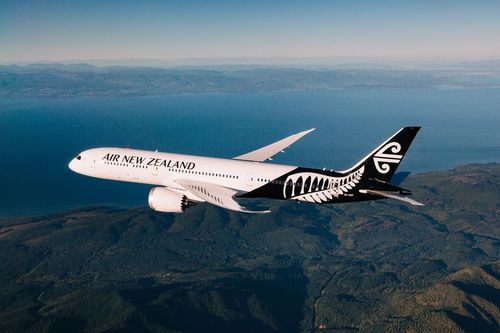Air New Zealand seeks innovators in global search for SAF

SOURCE: Air New Zealand
March 26, 2024
Air New Zealand has launched a global open invitation to innovators and start-ups in the sustainable aviation fuel (SAF) sector to become a supply partner to the airline.
It is the first time an airline has made a global call to potential suppliers in the burgeoning SAF industry to work together on supply opportunities.
The airline's Opportunity Statement, released on March 19, provides an overview of Air New Zealand's SAF requirements based on its network, fleet, sustainability targets and criteria. It is intended to kickstart discussion for ongoing collaboration as well as identify new opportunities.
Air New Zealand Chief Sustainability Officer, Kiri Hannifin, says SAF is integral to the aviation industry's future, which faces a very steep challenge to decarbonize.
Advertisement
Advertisement
"Air New Zealand plays an essential role in connecting New Zealand's people, tourism, and trade to the world, but we must find a way to do this more sustainably and as quickly as we can. A stable supply of SAF is critical to our ability to reduce carbon emissions and continue to play this role for the long term.
"That's why we've taken this novel approach, asking emerging SAF producers from around the world to connect with us and respond to the Opportunity Statement," says Hannifin.
"Air New Zealand is an ideal airline partner for SAF innovators and producers. We have a mature understanding of SAF, a clear roadmap to meet our targets, and the volumes of SAF we need to align with current production capabilities.
"Our airline is known for pushing boundaries and challenging ourselves to think differently, and we're also deeply committed to meeting our decarbonization goals. This Opportunity Statement shares our vision and allows current and future SAF producers to recognize both the opportunity and Air New Zealand's ambition to become a customer as soon as possible."
Air New Zealand was just the second airline globally to announce an interim science-based target. The interim target, validated by the Science Based Targets initiative (SBTi), requires a 28.9% reduction in carbon intensity by 2030, from a 2019 baseline.
Advertisement
Advertisement
Air New Zealand anticipates it will need SAF to make up around 20% of its total fuel uptake by 2030, alongside a long term and strategic regulatory package, which it is actively advocating for.
This is the latest step in Air New Zealand's journey to achieve net zero carbon emissions by 2050, after partnering with pioneers of next-generation aircraft technology through its Mission Next Gen Aircraft Programme, co-funding the research and development of a domestic SAF industry, and investing in the United Airlines Ventures Sustainable Flight Fund.
Air New Zealand is looking to enter short, medium, and long-term SAF offtake agreements, recognizing these are often critical to the business case for a plant, mitigating risk through providing demand certainty for the SAF producer, its investors, and financiers.
You can access the Opportunity Statement here.
Related Stories
CoBank’s latest quarterly research report, released July 10, highlights current uncertainty around the implementation of three biofuel policies, RFS RVOs, small refinery exemptions (SREs) and the 45Z clean fuels production tax credit.
The U.S. Energy Information Administration maintained its forecast for 2025 and 2026 biodiesel, renewable diesel and sustainable aviation fuel (SAF) production in its latest Short-Term Energy Outlook, released July 8.
XCF Global Inc. on July 10 shared its strategic plan to invest close to $1 billion in developing a network of SAF production facilities, expanding its U.S. footprint, and advancing its international growth strategy.
U.S. fuel ethanol capacity fell slightly in April, while biodiesel and renewable diesel capacity held steady, according to data released by the U.S. EIA on June 30. Feedstock consumption was down when compared to the previous month.
XCF Global Inc. on July 8 provided a production update on its flagship New Rise Reno facility, underscoring that the plant has successfully produced SAF, renewable diesel, and renewable naphtha during its initial ramp-up.
Upcoming Events










